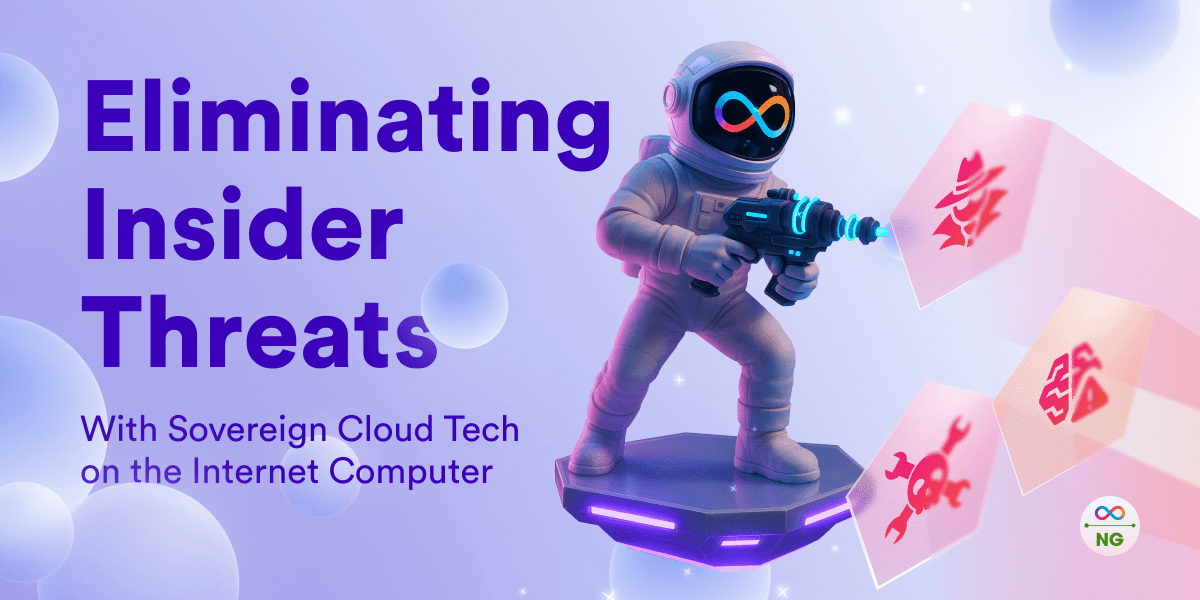
Insider threats remain one of the most complex and damaging risks in cybersecurity today. While headlines often focus on external attacks, breaches caused by individuals within an organisation, whether malicious or negligent, can lead to equally, if not more, devastating consequences.
As enterprises grow increasingly digital and data-driven, traditional IT architectures are no longer enough to guard against these internal vulnerabilities. Enter the sovereign cloud, an innovation rooted in decentralization and driven by the Internet Computer Protocol (ICP).
In a recent episode of World Computer Tech Talks, Bjoern Tackmann, Head of Research at the DFINITY Foundation, presented a compelling case for sovereign cloud technology as a defence mechanism against insider threats. His insights offer a new perspective for builders and users in the ICP ecosystem, demonstrating how decentralized infrastructure can transform enterprise security from the ground up.
Understanding the Real Cost of Insider Threats
Insider threats are unique in that they bypass many of the perimeter-focused defences enterprises put in place. Firewalls and antivirus software may stop unauthorised outsiders, but they often fall short when the threat actor has legitimate access to the system.
These threats manifest in various forms: a disgruntled employee leaking confidential information, a careless user mishandling sensitive data, or a compromised insider unknowingly serving as a conduit for an external attacker. The challenge is not only in detecting such behaviour but also in building systems that make abuse of internal access significantly harder, if not impossible.
Tackmann emphasises that the root of the problem lies in centralized control. When one person or team can override systems or bypass audit trails, the organisation becomes vulnerable by design. Sovereign cloud infrastructure aims to eliminate this structural weakness.
What Is a Sovereign Cloud?
A sovereign cloud refers to an IT environment where no single entity has unilateral control. Instead, it enforces governance, access, and execution rules through cryptographic mechanisms and decentralized protocols. This model is particularly suited to enterprises seeking to ensure long-term data integrity, regulatory compliance, and resilience against internal abuse.
Built on the Internet Computer, the sovereign cloud introduces several key components designed to neutralise insider risks:
- Multi-Signature Approval Workflows: Traditional IT systems often operate with administrative privileges granted to a single user or a small group. In contrast, the sovereign cloud enforces multi-signature mechanisms, meaning no critical change or action can be executed without consensus from multiple authorised parties. This design significantly reduces the risk of rogue behaviour.
- Immutable Policy Enforcement via Smart Contracts: On the sovereign cloud, policies are not subject to human discretion; they are written into smart contracts. These contracts define what is allowed and what isn’t, and once deployed, they cannot be altered without following predefined governance rules. This immutability ensures consistent enforcement of security protocols.
- Decentralized Infrastructure: The Internet Computer’s network of independent data centres ensures that applications and services do not reside on any single cloud provider. This decentralization enhances fault tolerance and limits the power of any one entity, aligning with the principles of self-custody and zero-trust.
- Auditability and Transparency: All actions within the sovereign cloud can be traced and verified through on-chain records. This transparency discourages misconduct and simplifies compliance with regulatory requirements.
Why Orbit on ICP Matters
At the heart of the sovereign cloud concept is Orbit, a platform on the Internet Computer that allows organisations to build and run decentralized applications (dapps) with enterprise-grade security.
Orbit provides a full-stack environment for deploying applications directly on-chain, meaning the business logic, storage, and data interactions occur without reliance on traditional cloud intermediaries. For companies concerned with privacy, governance, and data sovereignty, this is a major breakthrough.
What makes Orbit particularly powerful in combating insider threats is its built-in support for secure workflows and verifiable access controls. Organisations can implement approval chains, assign granular permissions, and monitor user behaviour through a tamper-proof ledger, all within a trustless environment.
Tackmann’s talk was not just a theoretical discussion; it was a call to action. Developers on ICP now have the tools to design infrastructure that goes beyond conventional security models. Whether you're building enterprise applications, cloud services, or governance tools, the sovereign cloud unlocks a new level of trust and reliability.
For enterprise users, especially those in finance, health, or government sectors, the implications are profound. Deploying applications on a sovereign cloud means reducing reliance on traditional IT vendors, eliminating single points of failure, and embracing a model where rules are enforced by code, not people.
Conclusion
The sovereign cloud on the Internet Computer is reshaping enterprise technology by embedding trust directly into infrastructure through decentralized protocols. While insider threats remain a persistent risk, adopting sovereign cloud solutions like Orbit enables organisations to build systems that prevent abuse by design. This shift benefits not only enterprise leaders but also developers, empowering them to create secure, resilient dapps fit for the future of the decentralized web.